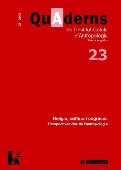Who gives innate gifts? Cognitive and cultural approaches to Turkic South Siberian shamanism
Article Sidebar

Main Article Content
Charles Stépanoff
In Siberia a lot of a facts confirm an essentialist interpretation of shamanism: frequent distinction between genuine and false shamans, physical particularities, like illness, attributed to shamans, absence of initiation, and hereditary mode of transmission of the "shamanic gift". This seems to draw shamans as individuals stroked by a genetic illnes, or as members of a peculiar species, either way, biologically different individuals. This kind of interpretation was not developed in the main anthropological analysis about Siberian shamanism. Cultural interpretations of "shamanic gift" were founded on explicit native explanations like myths, tales and narratives of the shamans about themselves. Theses narratives link shamanic function with the election of the specialist by a supernatural agents. Some narratives suggest that if this relationship appears to be broken, the shaman may lose his status and even be killed by his group. Indeed, the essentialist interpretation contrasts with numerous ethnographic descriptions in the world, even from Boyer himself, which underlines the relational foundation of religious competency. Neverthless, I argue that no one of those theses can be entirely rejected, and the apparent contradiction can be resolved if we take into account the contexts and different kinds of speech in which these models are actualized. One could say that some kinds of interaction favour cognitivist speech and others structuralist speech. This study is based on new fieldwork material from Tuva (South Siberia).
Article Details
Com citar
Stépanoff, Charles. “Who gives innate gifts? Cognitive and cultural approaches to Turkic South Siberian shamanism”. Quaderns de l’Institut Català d’Antropologia, no. 23, pp. 79-102, https://raco.cat/index.php/QuadernsICA/article/view/136823.